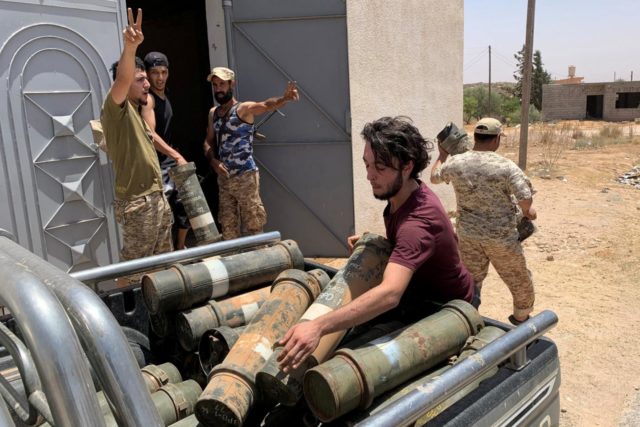

The success of the Tripoli-based Government of National Accord (GNA) in forcing the withdrawal of the eastern-based Libyan National Army (LNA) from northwestern Libya has led to a temporary détente in the conflict. As GNA officials contemplate an assault on the strategic city of Sirte, divisions have resurfaced between Tripoli’s numerous militias. These divisions indicate the significant internal difficulties the GNA will likely face, regardless of further military success.
Since its creation in 2015, the GNA has relied heavily on myriad militia groups. These groups not only provide security in GNA territory, they also make up the majority of its fighting force against the LNA. In return, militia groups have gained access to state institutions and increased funding, which has bolstered their influence and power.
Despite apparent alignment with the GNA, ideological orientations and loyalties vary among the militias. The inter-militia differences within the GNA have been exacerbated by the increasing presence of foreign militias—notably the Syrian militants flown in by Turkey to strengthen military support in the conflict against the LNA (The National, July 18).
Rivalries between domestic militia groups temporarily halted due to the existential threat posed by the LNA’s 15-month assault on Tripoli. Since the LNA’s withdrawal from Tripoli on June 4, however, signs of divisions have resurfaced. On July 8, GNA-funded militia groups clashed in the Janzur neighborhood of Tripoli (UNSMIL, July 11). Ten militants were killed in these clashes, apparently over access to energy infrastructure (Libya Herald, July 11). Further inter-militia clashes occurred on July 31 in the Ain Zara neighborhood of southern Tripoli following an argument over the purchase of fuel (al-Ain, July 31). The latter incident forced the GNA Ministry of the Interior to establish patrols in Ain Zara to maintain security (Ministry of the Interior, August 4).
The increased presence of foreign militants has also affected the inter-militia balance. The changing demographic caused by the influx of Syrian militants has provoked fears of a major divide in the GNA camp. Hundreds of Syrian militants were filmed holding up the Turkish flag and pictures of Turkish President Recep Tayyip Erdogan in Janzur on August 5 (al-Arabiya, August 5). While no clashes have occurred between foreign and domestic militias, a Tripoli security source stated that tensions between the two groups have increased due to differences in ideology and allegiance (al-Arabiya, August 2).
With the frontline of the civil war solidified around Sirte in the center of Libya, GNA forces are now stretched over an expanse of 400 kilometers. Some of the more nominally GNA-aligned militias will be able to take advantage of the increased security vacuum to solidify control and power. Territorial encroachment and competition for assets are a major driver in inter-militia conflict, and clashes are likely to intensify over the coming months.
The resultant instability could also be intensified if an escalation occurs in the battle for control of Sirte. Due to its key strategic location, major GNA stakeholders, such as Turkey, will bolster the GNA’s military capabilities ahead of any future battle to ensure victory. Rather than relying on domestic militias, Turkey and the GNA are likely to increase reinforcements from abroad. Both Turkey and the GNA prefer to resort to foreign militias because it reduces their dependency on domestic militias looking to benefit from a future political settlement.
However, the increased dependency on foreign militias will further destabilize security in GNA territory. Domestic militias are likely to become increasingly resentful as they are crowded out and replaced by their foreign counterparts. The more these militia groups fear they will not benefit from a country controlled by the GNA, the more they will be open to defection to the LNA or other actors. Even without defection, their decreased involvement in the conflict may lead some militias to focus their profit-making efforts elsewhere, whether through increasing control over state assets in GNA-controlled territory or through other criminal activities, such as movement taxes and kidnapping.
This potential instability makes it imperative for the GNA to establish control over or disarm its militias. While the United States has intensified calls for security sector reform and militia disarmament, the GNA has not shown a real willingness, let alone the capability, to carry out these reforms (U.S. Department of State, June 26).
GNA Security Sector Reform
Security sector reform is also vital for the stability of the GNA in the long-term. Militia groups may have played a prominent role in the GNA’s recent military successes, but their influence harms the GNA’s political legitimacy. The GNA cannot showcase itself as a democratic, civilian-led, rule-of-law state while unaccountable militia groups wield significant and independent control. Until the GNA achieves a monopoly on the legal use of force by its various actors, it will struggle to establish itself as a legitimate political force.
The GNA will face significant difficulties if and when they decide to carry out the reforms. Incorporating militia groups into a coherent and unified security force while coercing other militia groups to disarm remains a massive task. Such an undertaking is unlikely to be viewed as an attractive option while negotiating an imminent and potentially crucial battle over Sirte.
Delaying reform until the GNA takes control of Sirte, however, would be equally problematic. Control over the city would give the GNA access to significant oil revenue, which could lead to a flurry of militia attempts to divert a percentage of the profits. Likewise, the increased delay in undertaking reform would allow militias further time to entrench control and extend power.
|